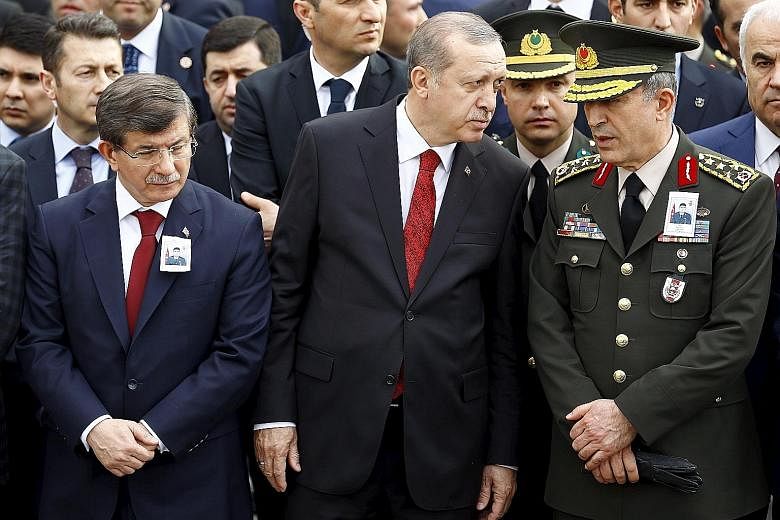ISTANBUL • After over 11/2 years of cohabitation, cracks are emerging in Turkey's ruling tandem of President Recep Tayyip Erdogan and Prime Minister Ahmet Davutoglu, sparking uncertainty over the premier's future.
Many believed Mr Davutoglu would be a puppet premier when Mr Erdogan switched to the presidency in August 2014, but the former foreign minister has made conspicuous efforts to carve out his own profile, to the possible irritation of the combative head of state.
And last week's decision by the executive committee of the ruling Justice and Development Party (AKP) to remove Mr Davutoglu's right to appoint regional party officials has been seen as a starting shot in a conflict to undermine his authority.
Potential successors, who could be more pliant for Mr Erdogan, are lurking in the background, including the president's long-time henchman, Transport Minister Binali Yildirim, and Energy Minister Berat Albayrak, 38, who is married to the president's eldest daughter Esra.
"There is inevitably a potential for clashes and these have begun to happen," Dr Ilter Turan, a professor of political science at Bilgi University in Istanbul, told AFP.
"Obviously, these are men of political ambition, so there is ample reason to think there is a substantial contention for power within the ruling party."
Observers say the April 29 decision by the AKP's top executive committee (MKYK) to rob Mr Davutoglu of a key power as party chairman marks a key moment for a party that always prided itself on unity since coming to power in 2002, after years of unstable coalitions.
Dr Turan said that while Turkey had a history of conflicts between presidents and prime ministers going back to the presidency of Turgut Ozal from 1989, "the AKP has so far been quite successful in not letting internal rifts develop in struggles for power".
AKP spokesman Omer Celik denied there is any "crisis" in the party, describing the MKYK's decision as a "technical" move which Mr Davutoglu had himself signed off on.
"Although party officials commented this was a routine move, such an action was not taken by previous MKYKs," said Mr Ozgur Altug, chief economist at BGC partners in Istanbul.
Mild-mannered during his long stint as foreign minister, Mr Davutoglu has undergone a transformation as premier, whipping up crowds with nationalist and religious-tinged rhetoric in sometimes ear-splitting speeches.
The premier on Tuesday, in a speech to his party, for the first time addressed the speculation head on, saying: "I don't fear the discord that some try to sow or what some write, I fear only God."
AGENCE FRANCE-PRESSE

